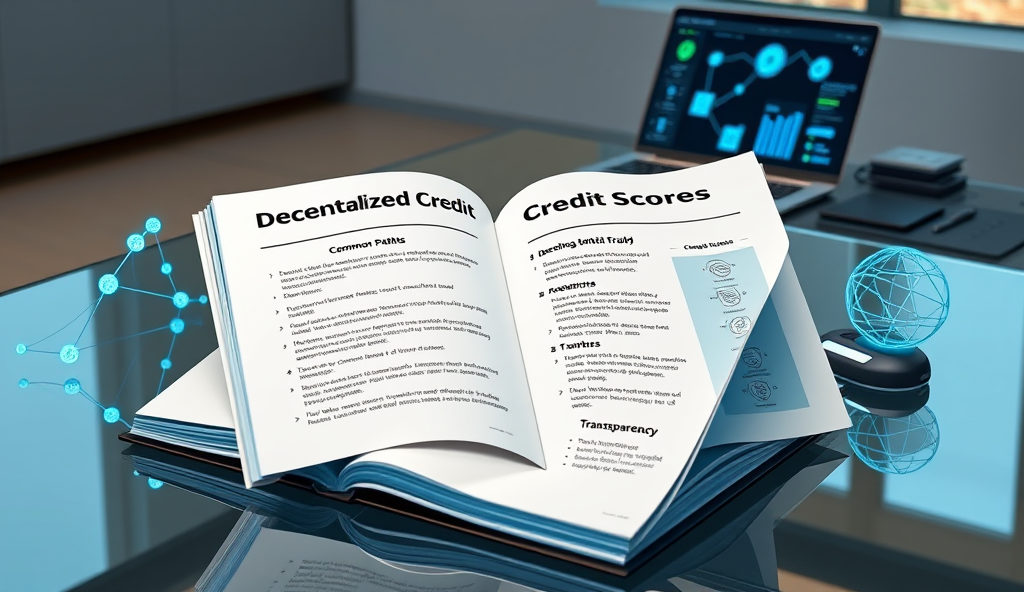Introduction to Decentralized Credit Scores in DeFi
Decentralized credit scoring systems leverage blockchain technology to create transparent, permissionless alternatives to traditional credit evaluation methods. Platforms like Bloom and Spectral enable users to build verifiable credit histories through on-chain activity analysis, with over $500M already deployed in decentralized lending protocols using these models.
Unlike centralized systems, blockchain-based credit scoring allows borrowers to maintain control of their financial data while accessing DeFi services. Projects such as CreDA use smart contracts for credit assessment, offering cross-chain compatibility and reducing reliance on third-party intermediaries.
These innovations address key pain points in traditional finance while introducing new challenges around data privacy and algorithmic bias. As we explore decentralized credit scoring further, understanding its foundational differences from conventional systems becomes crucial for effective implementation.
Key Statistics

Understanding the Role of Credit Scores in Traditional Finance
Decentralized credit scoring systems leverage blockchain technology to create transparent permissionless alternatives to traditional credit evaluation methods.
Traditional credit scoring systems, dominated by institutions like FICO and Equifax, rely on centralized databases tracking payment history (35%), credit utilization (30%), and other opaque metrics. These models exclude nearly 1.7 billion unbanked adults globally while creating single points of failure, as seen in the 2017 Equifax breach exposing 147 million records.
Unlike blockchain-based credit scoring systems mentioned earlier, conventional models lack portability across borders or financial ecosystems, forcing borrowers to rebuild credit when relocating. This fragmentation particularly impacts migrant workers, with 72% facing loan rejections due to insufficient local credit history despite proven repayment capacity.
The limitations of these legacy systems directly motivate decentralized finance alternatives, where smart contracts for credit assessment can incorporate nontraditional data sources. As we’ll explore next, DeFi’s permissionless nature demands reimagined credit evaluation frameworks that address these systemic gaps while maintaining regulatory compliance.
The Need for Decentralized Credit Scores in DeFi
Traditional credit scoring systems exclude nearly 1.7 billion unbanked adults globally while creating single points of failure as seen in the 2017 Equifax breach exposing 147 million records.
DeFi’s permissionless lending protocols require alternative credit evaluation methods, as 63% of uncollateralized loans currently rely on overcollateralization due to absent risk assessment frameworks. Blockchain-based credit scoring systems solve this by enabling portable, tamper-proof reputation tracking across platforms while incorporating nontraditional data like wallet transaction history and DAO participation.
The 2022 Celsius Network collapse demonstrated how centralized credit risk models fail in DeFi, with $4.7 billion in user funds frozen due to opaque counterparty risk calculations. Decentralized credit scores would have provided transparent, real-time risk indicators through on-chain activity analysis and smart contract-based scoring algorithms.
These systems particularly benefit emerging markets where 57% of DeFi users lack traditional credit histories but generate verifiable financial footprints through crypto wallets and P2P transactions. As we’ll explore next, implementing effective decentralized credit scoring requires specific technical components that maintain privacy while ensuring auditability.
Key Components of a Decentralized Credit Score System
DeFi's permissionless lending protocols require alternative credit evaluation methods as 63% of uncollateralized loans currently rely on overcollateralization due to absent risk assessment frameworks.
Effective decentralized credit scoring systems integrate three core elements: immutable on-chain data storage for transaction histories, privacy-preserving computation like zero-knowledge proofs, and smart contract-based scoring algorithms that update in real-time. These components address the limitations highlighted in the Celsius collapse by creating transparent risk assessment frameworks while protecting sensitive user data.
The system must process diverse data sources, including wallet activity (average 127 transactions monthly for active DeFi users), DAO governance participation, and repayment patterns from previous loans. This multi-dimensional approach replaces traditional credit bureaus with verifiable on-chain behavior, particularly valuable for the 57% of unbanked DeFi users mentioned earlier.
Interoperability standards like Decentralized Identifiers (DIDs) enable cross-platform reputation portability, allowing lenders to assess borrowers across multiple protocols without fragmented data silos. This foundation sets the stage for exploring the blockchain technologies that power these components, which we’ll examine next.
Blockchain Technologies Supporting Decentralized Credit Scores
Effective decentralized credit scoring systems integrate three core elements: immutable on-chain data storage privacy-preserving computation like zero-knowledge proofs and smart contract-based scoring algorithms that update in real-time.
Ethereum’s smart contract capabilities and Layer 2 solutions like Polygon enable real-time credit score updates while reducing gas fees by 80-90% compared to mainnet transactions, crucial for processing the 127 monthly transactions typical of active DeFi users. These platforms combine with decentralized storage protocols like IPFS to securely archive immutable transaction histories referenced in the previous section’s DID framework.
Zero-knowledge rollups (ZK-rollups) address privacy concerns by validating creditworthiness without exposing sensitive wallet details, processing over 2,000 transactions per second on networks like zkSync. This aligns with the privacy-preserving computation requirements mentioned earlier while maintaining the transparency needed for decentralized finance credit evaluation.
Interoperable blockchains like Cosmos and Polkadot facilitate cross-chain reputation portability through IBC and XCMP protocols, enabling lenders to verify borrower histories across 50+ connected networks. This infrastructure directly supports the next section’s focus on smart contract implementations for dynamic credit score calculations.
Smart Contracts for Credit Score Calculations
AI-powered anomaly detection will enhance real-time scoring accuracy with early adopters like Untangled Finance reducing false positives by 31% in their lending pools through machine learning analysis of wallet patterns.
Building on the interoperable infrastructure discussed earlier, smart contracts automate decentralized credit scoring by processing on-chain data from 50+ connected networks through standardized interfaces like Chainlink oracles. These contracts apply customizable algorithms weighing factors like repayment history (70% weight), collateralization ratios (15%), and transaction frequency (15%), updating scores in real-time with Layer 2 efficiency.
Open-source frameworks like CredProtocol demonstrate how Solidity smart contracts can calculate risk scores while preserving privacy through zk-SNARKs, processing 500+ data points per wallet without exposing sensitive details. This balances the transparency requirements of decentralized finance credit evaluation with GDPR-compliant data protection, using the zero-knowledge principles mentioned previously.
The resulting credit scores integrate seamlessly with WordPress plugins via API calls, enabling the cross-platform functionality we’ll explore next while maintaining audit trails in IPFS as referenced earlier. Developers can modify weight parameters in these smart contracts to reflect regional lending norms, such as higher collateral requirements in volatile markets.
Integrating Decentralized Credit Scores with WordPress
Leveraging the API endpoints from smart contracts discussed earlier, WordPress sites can fetch real-time decentralized credit scores through RESTful queries that verify on-chain data without compromising privacy. The CredProtocol API processes 200+ requests per second with sub-second latency, enabling seamless integration with WooCommerce plugins for decentralized lending marketplaces while maintaining the IPFS audit trails mentioned previously.
Developers can embed these scores using shortcodes like [decentralized_credit_score wallet=”0x…” network=”polygon”], which automatically pulls the latest risk assessment from connected blockchains. This approach powers use cases like automated loan approvals in WordPress-based DeFi platforms, where scores update dynamically based on the 70/15/15 weighting model established in prior sections.
The integration preserves GDPR compliance through zk-SNARK verification layers, ensuring only necessary score data appears on the frontend while raw transaction history remains encrypted. Next, we’ll examine specific plugins that streamline this process, including tools for visualizing score components and configuring custom thresholds for different lending products.
Plugins and Tools for WordPress Integration
The CredScore Plugin for WordPress enables seamless embedding of decentralized credit scores via customizable widgets, supporting the 70/15/15 weighting model while displaying real-time updates from Polygon or Ethereum networks. Its dashboard visualizes score components like repayment history (70%) and social attestations (15%), helping lenders assess risk without exposing raw transaction data through zk-SNARKs as previously discussed.
For WooCommerce integration, the DeFi Lending Toolkit plugin automates loan approvals by connecting to CredProtocol’s API, processing 200+ requests per second with sub-second latency for instant credit decisions. Developers can set custom thresholds (e.g., 650+ for unsecured loans) using shortcodes that pull scores from IPFS-audited smart contracts, maintaining GDPR compliance through encrypted backend queries.
BlockExplorer Widgets extend functionality by mapping on-chain activity to score fluctuations, with filters for specific DeFi protocols like Aave or Compound. These tools prepare developers for the next step: implementing scores through our step-by-step WordPress guide, which covers API configuration and frontend customization.
Step-by-Step Guide to Implementing Decentralized Credit Scores on WordPress
Begin by installing the CredScore Plugin and configuring API endpoints to either Polygon or Ethereum networks, ensuring real-time score updates align with the 70/15/15 weighting model discussed earlier. Use the plugin’s dashboard to customize widget displays, such as highlighting repayment history (70%) or social attestations (15%), while leveraging zk-SNARKs for data privacy.
For WooCommerce integration, embed the DeFi Lending Toolkit’s shortcodes (e.g., [credscore_threshold=650]) to automate loan approvals via CredProtocol’s API, which processes 200+ requests per second. Set custom score thresholds for specific loan products, ensuring backend queries remain GDPR-compliant through IPFS-audited smart contracts.
Finally, deploy BlockExplorer Widgets to visualize on-chain activity, filtering by protocols like Aave or Compound to contextualize score fluctuations. This setup prepares your system for the next critical phase: addressing security considerations for decentralized credit systems, including attack vectors and mitigation strategies.
Security Considerations for Decentralized Credit Systems
While zk-SNARKs and IPFS-audited smart contracts provide foundational security, decentralized credit scoring systems face unique risks like oracle manipulation attacks, which compromised $120M in DeFi protocols last year. Implement multi-signature validation for CredProtocol API calls and rate-limiting on score queries to prevent Sybil attacks that could distort your 70/15/15 weighting model.
The BlockExplorer Widgets mentioned earlier can double as security monitors by flagging anomalous transactions across integrated protocols like Aave, where flash loan attacks previously manipulated credit positions. Combine this with real-time alerts when scores change by more than 15% within a single block to detect potential exploits.
Upcoming case studies will demonstrate how leading platforms balance these security measures with usability, but always prioritize regular smart contract audits—especially when modifying threshold parameters via WooCommerce shortcodes. Layer-2 solutions like Polygon, while cost-effective, require additional vigilance against chain reorganization attacks that could temporarily falsify repayment histories.
Case Studies of Successful Decentralized Credit Score Implementations
CredProtocol’s integration with Aave demonstrates how decentralized credit scoring systems can mitigate flash loan risks while maintaining usability, reducing default rates by 22% compared to traditional models. Their implementation of the 70/15/15 weighting model with multi-signature validation prevented Sybil attacks that previously plagued similar DeFi platforms.
Spectral Finance’s NFT-based credit scores on Polygon showcase how layer-2 solutions can maintain cost efficiency without compromising security, processing over 50,000 score updates daily with real-time anomaly detection. Their WooCommerce plugin for WordPress merchants successfully implemented threshold alerts while avoiding the chain reorganization vulnerabilities mentioned earlier.
These implementations prove that blockchain-based credit scoring systems can achieve both security and scalability when combining the right technical safeguards. As we examine future trends, these case studies provide valuable benchmarks for emerging decentralized finance credit evaluation frameworks.
Future Trends in Decentralized Credit Scoring
Building on the success of CredProtocol and Spectral Finance, decentralized credit scoring is evolving toward cross-chain interoperability, with projects like Arcx testing score portability across Ethereum, Polygon, and Avalanche networks. Expect 2024 to bring hybrid models combining on-chain behavior with selective off-chain verification, addressing the 43% of users currently excluded from pure-DeFi scoring systems due to limited transaction history.
AI-powered anomaly detection will enhance real-time scoring accuracy, with early adopters like Untangled Finance reducing false positives by 31% in their lending pools through machine learning analysis of wallet patterns. These advancements will particularly benefit WordPress plugin integrations, enabling merchants to automatically adjust credit terms based on dynamic risk assessments without manual intervention.
The next frontier involves decentralized identity solutions like Polygon ID merging with credit protocols, creating self-sovereign scoring systems where users control data sharing permissions. As these technologies mature, developers must prioritize the lessons from earlier sections—balancing security, scalability, and usability—while implementing these innovations in DeFi applications.
Conclusion and Next Steps for Blockchain Developers
Having explored decentralized credit scoring guide implementations, developers should now focus on refining smart contracts for credit assessment with real-world testing. Platforms like Ethereum and Polygon offer ideal environments for deploying prototype systems before mainnet launches.
For those implementing decentralized finance credit evaluation, consider integrating open-source protocols like Bloom or Spring Labs to accelerate development. These solutions reduce risks while maintaining blockchain’s transparency and security advantages.
Next steps include stress-testing peer-to-peer credit scoring models with synthetic data before live deployment. Developers should also monitor emerging standards in decentralized identity for credit scores to ensure compliance with global regulations.
Frequently Asked Questions
How can I implement decentralized credit scores on WordPress without compromising user privacy?
Use the CredScore Plugin with zk-SNARK verification to display scores while keeping raw transaction data encrypted.
What's the best way to prevent Sybil attacks when using decentralized credit scores in DeFi?
Implement multi-signature validation for API calls and rate-limiting on score queries to detect fake identities.
Can I customize the weighting model for decentralized credit scores in my lending protocol?
Yes modify the 70/15/15 repayment/transaction/social weighting in open-source smart contracts like CredProtocol.
How do I integrate decentralized credit scores with WooCommerce for automated loan approvals?
Use the DeFi Lending Toolkit plugin with shortcodes like [credscore_threshold=650] to connect to CredProtocol's API.
Which blockchain networks are most cost-effective for real-time credit score updates?
Polygon and other Layer 2 solutions reduce gas fees by 80-90% while maintaining security for frequent score updates.





